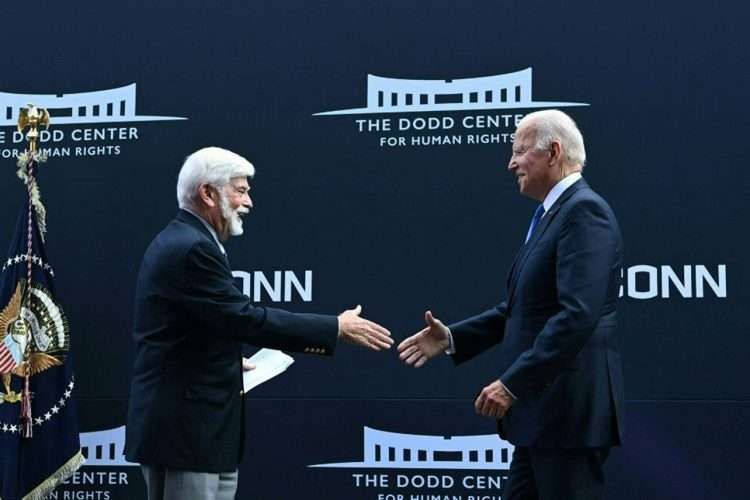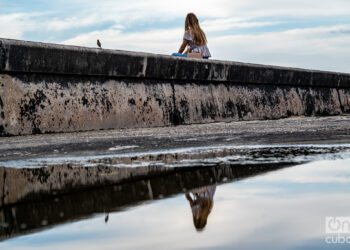The next nine months offer a window of opportunity for improving U.S.-Cuban relations if leaders in Washington and Havana have the political will and courage to seize it.
Diplomats in both the State Department and Cuban Foreign Ministry profess to want to build a more constructive relationship to replace the poisonous one President Donald Trump created, and they express guarded optimism about the possibilities. But time is short. By next fall, the U.S. presidential election season will be gearing up, making any major policy change politically perilous and much less likely.
Over the past nine months, both Washington and Havana have taken small steps to reduce tensions. Last April, Washington agreed to resume the semi-annual migration talks mandated by the 1994 U.S.-Cuban migration agreement, but broken off by Trump in 2018. With tens of thousands of Cubans arriving on the U.S. southern border monthly and thousands more landing on Florida’s south coast and keys, the Biden administration had an urgent interest in regularizing Cuban immigration.
Migration, exchanges and disaster relief: current point of Cuba-U.S. relations
Since then, there have been two rounds of talks which both sides describe as constructive and productive. Washington has restaffed its embassy and reopened consular services so that, for the first time in five years, the United States met its obligation under the 1994 agreement to provide Cubans with 20,000 immigrant visas annually. Cuba agreed to accept flights of deportees who enter the U.S. illegally along the southern border. The success of the migration discussions has led to a resumption of diplomatic dialogues on a range of issues of mutual interest.
Last May, facing pressure from Latin Americans over his decision to exclude Cuba, Nicaragua, and Venezuela from the Ninth Summit of the Americas, President Biden lifted Trump’s restrictions on remittances and restored the people-to-people travel license under which most U.S. residents visited Cuba before Trump abolished it. More still needs to be done to make these policy changes effective, but remittances and income from foreign visitors are two of the main sources of income for the Cuban economy as it struggles to recover from the COVID-19 pandemic.
In response, Cuba took the politically difficult step of giving in to U.S. pressure to replace the financial institution processing remittances from one managed by the armed forces to an alternative civilian firm. That’s a step Havana had resisted ever since Trump blocked U.S. companies from doing business with the military firm, forcing Western Union to close hundreds of offices across the island. Although Western Union has yet to resume operations, U.S. sanctions no longer proscribe it. The Treasury Department recently granted a small travel agency in Miami a license to wire remittances through the new Cuban civilian firm.
After Hurricane Ian tore through western Cuba in October, the State Department offered two million dollars in humanitarian assistance to rebuild homes and, for the first time, President Miguel Díaz-Canel gratefully accepted.
In November, Biden appointed former Senator Christopher Dodd as Special Presidential Advisor for the Americas. Biden and Dodd served together in the U.S. Senate for almost 30 years. “Chris and I have known each other for a long time,” the president said in 2021. “We truly are really good, close friends.” When Biden chaired the Senate Foreign Relations Committee in the decade before becoming vice-president, Dodd was chair of the Western Hemisphere Subcommittee and, in Biden’s words, “a leading voice on engagement with Latin America and the Caribbean.”
Biden has turned to Dodd repeatedly to manage important, politically sensitive tasks. Dodd led the team that selected then-Senator Kamala Harris as Biden’s running mate. In 2021, Dodd went to Taiwan on Biden’s behalf to reassure its leaders of U.S. support as tensions with China mounted. In early 2022, with the Summit of the Americas at risk of collapse due to a boycott led by Mexico’s Andrés Manuel López Obrador, Biden asked Dodd to salvage it. In the end, López Obrador and several other heads of state stayed away, but the leaders of the other major Latin American countries attended, avoiding an embarrassing diplomatic debacle.
Asking Dodd to take on the new role of Special Presidential Advisor for the Americas is a tacit acknowledgment by Biden that his Latin America policy is in disarray. At the center of that disarray is his ill-advised retention of Trump’s sanctions policy aimed at starving Cuba into submission — a policy rejected by every major country in Latin America (not to mention Canada and the European Union).
Dodd knows perfectly well that the policy of hostility and regime change toward Cuba is a costly failure; during his Senate career, he consistently advocated ending the embargo. In Dodd’s new role, Cuba is high on the agenda — in particular, finding ways to build on the progress that has been made in bilateral relations over the past nine months. Washington should take the initiative because it was Washington, under Trump, that ruptured the relationship President Barack Obama built.
There is no shortage of steps Biden could take to improve relations. Many of the sanctions Trump imposed are still in place, crippling Cuba’s economy, immiserating Cuban families, and aggravating the migration crisis. The most obvious first step is to take Cuba off the list of state sponsors of international terrorism — a designation with no factual or legal basis, yet makes it extremely difficult for Cuba to engage in routine international financial transactions.
But if Biden is to weather the political flak he will get for changing his Cuba policy — flak both from Republicans and from another old Senate friend, current Foreign Relations Committee Chair Bob Menendez (D-N.J.) — the president will need to show that the Cubans are willing to address Washington’s concerns. For Biden, the top concern is the heavy prison sentences given to several hundred people arrested during the island-wide demonstrations on July 11-12, 2021, and the subsequent imprisonment of several prominent dissidents. Cuban diplomats suggest that Havana is willing to talk with Washington even about “sensitive issues,” but that any change on their side would have to be part of a broader agreement covering a range of issues, not a unilateral concession.
Prospects for a significant improvement in U.S.-Cuban relations appear to be better today than at any time since Biden entered the White House. Both sides recognize that the animosity Trump fostered does not serve the interests of either country, both have an incentive and stated willingness to pursue at least a limited rapprochement, and both have taken modest steps in that direction.
But to make major progress in the next nine months, both sides will need to step up the pace of dialogue and be willing to make some tough political decisions. There isn’t time to waste with an Alphonse and Gaston routine, dithering over who should act first or whose turn it is to act next. If they are to accomplish anything of consequence before the window of opportunity closes, both President Biden and President Díaz-Canel have to grasp the fierce urgency of now.
***
Originally published in Responsible Statecraft. OnCuba replicates this version with the author’s permission.











